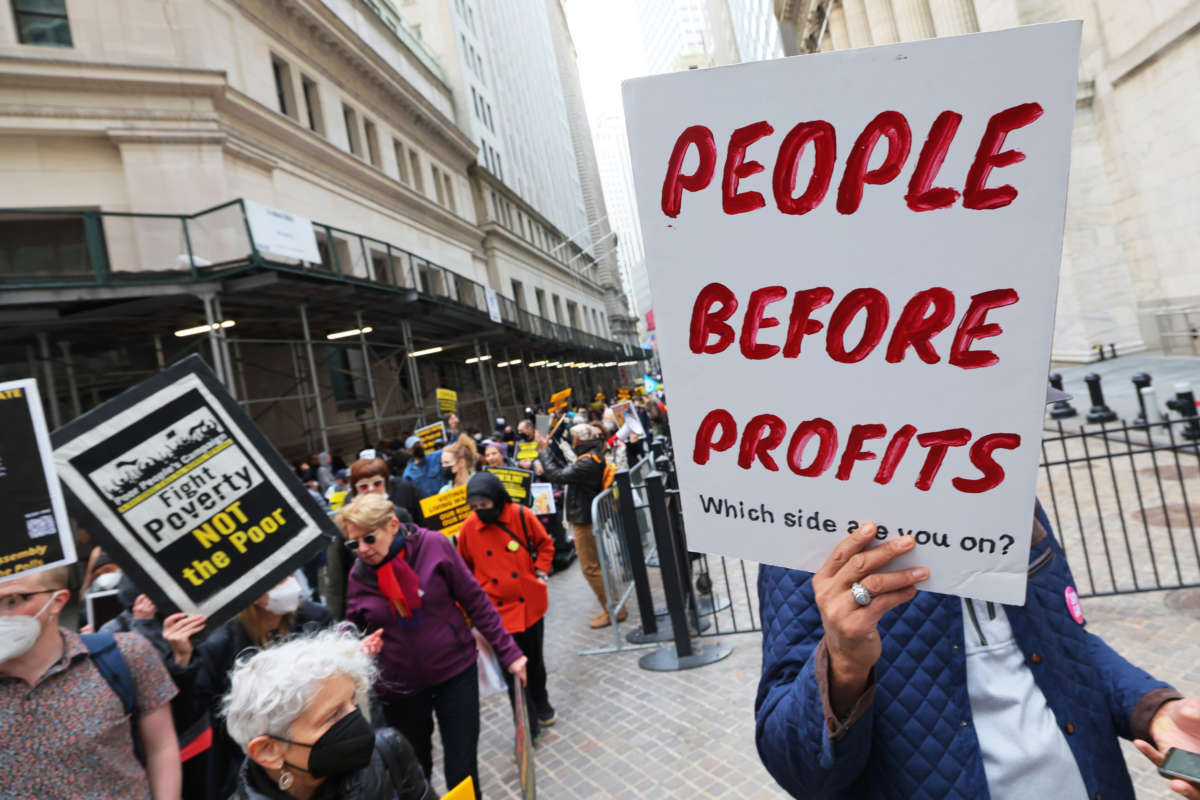Did you know that Truthout is a nonprofit and independently funded by readers like you? If you value what we do, please support our work with a donation.
State corporate tax revenues are declining, and state tax loopholes and cuts to corporate tax rates are allowing a majority of corporations in at least seven states to avoid paying any corporate income taxes, a new report finds.
In a new report from the Economic Policy Institute (EPI), over 60 percent of corporations in Connecticut, Illinois, Michigan, Tennessee and Wisconsin paid zero state corporate income taxes in varying periods between 2015 and 2019. In Colorado, 71 percent of corporations didn’t pay income taxes between 2017 and 2019, and in Florida, a whopping 92 percent of corporations paid zero income taxes between 2016 and 2019.
Even larger corporations were able to dodge paying income taxes, EPI’s Josh Bivens found. Between 12 and 27 percent of corporations with $1 billion in taxable income were able to dodge state corporate income taxes entirely over the four years studied.
It’s possible that corporations were able to avoid paying corporate income taxes in other states as well; EPI only studied states for which data is currently available. In a handful of states, like Ohio and Texas, corporations aren’t subject to corporate income taxes at all.
Over the past decades, the effective state and local corporate tax rate has fallen by half, despite surging corporate profits. In 1989, it was 5.2 percent; as of 2017, it was only 2.6 percent. If effective tax rates for corporations hadn’t started declining in the last few decades, EPI finds, then state and local governments would have taken in $57 billion more in revenue. This shortfall in revenue could finance a program to provide universal pre-kindergarten in the U.S.
“Corporate income taxes — both at the federal and S&L level — are highly progressive parts of the U.S. fiscal system,” meaning that corporate income taxes largely affect owners of corporations rather than workers or consumers, Bivens wrote. “The erosion of revenues collected from corporate income taxes has made the overall tax system less progressive, and at the state level it has been a key driver of overall revenue weakness, which in turn has fueled too-austere spending.”
Overall, as revenues are declining, states are becoming more and more reliant on federal funding and taxes paid by regular households in order to maintain roads and bridges, provide clean water, and fund education. The data suggests that reduced revenues likely have a direct impact on spending. Declining revenues also negatively affect Black and women workers, who are disproportionately employed with state and local tax revenues.
These declines come even as corporations are posting record profits in recent decades, meaning that corporations aren’t dodging taxes because they can’t pay them, but rather because they are able to exploit tax loopholes.
State and local officials shoulder at least part of the blame for declining revenues, EPI says, as governments have cut corporate income tax rates. There has also been a rise in corporate profits coming from S-corporations, which are able to pass their income taxes onto shareholders and typically don’t pay corporate income taxes. As such, classifying businesses as S-corporations is a popular way to avoid paying state corporate taxes.
Along with forcing regular taxpayers to shoulder much of the tax burden, there is no evidence that any of these state and local tax cuts “trickle down” to workers, the report finds. Instead, these tax cuts appear to benefit the richest Americans the most.
In a press conference on the release of the report, Mary Kay Henry, international president of the Service Employees International Union, expressed frustration over how easy it is for corporations to dodge paying state and local taxes.
“It’s absolutely unconscionable that while the two million members of SEIU who clean buildings, care for the elderly and provide essential public services pay their taxes every year, billionaires and their corporations are getting a free ride,” Henry said. “To have a government that works for all of us, we need a tax system that requires corporations and the wealthy to pay their due — period.”
Press freedom is under attack
As Trump cracks down on political speech, independent media is increasingly necessary.
Truthout produces reporting you won’t see in the mainstream: journalism from the frontlines of global conflict, interviews with grassroots movement leaders, high-quality legal analysis and more.
Our work is possible thanks to reader support. Help Truthout catalyze change and social justice — make a tax-deductible monthly or one-time donation today.
